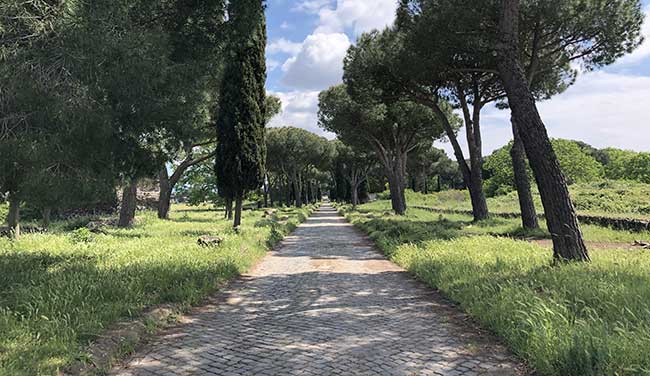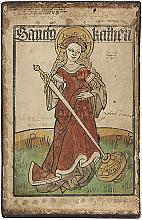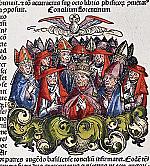Missions and martyrs

[Appia Antica regional park, 2019—Flavia Verona / [CC BY-SA 4.0] Wikimedia File:Appia Antica way.jpg|Appia_Antica_way ]
Along Roman roads came both Christians bearing good news and persecutors suppressing it. These excerpts from favorite CH articles tell some of the story of the early church.
All roads, thanks to Rome
What would it have been like to travel with the apostle Paul? According to historian Lionel Casson, not too unpleasant: “He could make his way from the shores of the Euphrates to the border between England and Scotland without crossing a foreign frontier. . . . He could sail through any waters without fear of pirates, thanks to the emperor’s patrol squadrons. A planned network of good roads gave him access to all major centers, and the through routes were policed well enough for him to ride them with relatively little fear of bandits.”
Thanks to the Pax Romana (Roman Peace) of Emperor Augustus (reigned 27 BC–AD 14), such conditions prevailed when Paul traveled the Roman world. Their marvelous road network (over 53,000 miles by AD 300) made fast travel possible. The average traveler could walk about 20 miles per day.
Travelers often faced dangers from the elements, such as snows, flooding, and wild animals, as well as robbers in isolated areas. Paul no doubt had some of these problems in mind when he wrote to the Corinthians, “I have been in danger from rivers, in danger from bandits . . . in danger in the country” (2 Cor. 11:26).
Those with access to a horse and carriage—typically only the wealthy, military personnel, or government officials—could cover 25 to 30 miles per day. Paul used a horse at least once—when soldiers escorted him from Jerusalem to Caesarea (Acts 23:23–24).
After a long day’s journey, where did travelers lodge? Inns existed, but well-to-do Romans avoided them: they had a reputation for adulterated wine, filthy sleeping quarters, extortionate innkeepers, gamblers, thieves, and prostitutes. Christians practiced hospitality for traveling believers for these reasons. On his journeys Paul stayed with Lydia in Philippi (Acts 16:15), Jason in Thessalonica (Acts 17:5), and Gaius in Corinth (Rom. 16:23).
But the fastest form of long-distance travel was by ship—at least in one direction. Paul sailed from the Aegean to Palestine but always went overland the other way. The reason is simple: prevailing winds during summer, the sailing season, generally blew from the northwest, thus greatly easing an eastward voyage. Passenger ships did not exist, but people sailed on cargo ships as space was available. Ships left with favorable winds and omens. It cost a family only two drachma (two days’ wages) to sail from Alexandria to Athens, which included water but not food and cabins.
The safe sailing season was from late spring to early fall. Fearing shipwreck, sailors avoided winter except for emergencies or military campaigns. In his second letter to Corinth, Paul mentions being shipwrecked three times and once spending a night and a day in open sea. Luke’s description of another wreck in Acts 27 is one of the most vivid narratives in all of ancient literature.
Compared to previous centuries, Paul’s travel conditions were ideal. As Irenaeus, the second-century bishop of Lyons, put it, “The Romans have given the world peace, and we travel without fear along the roads and across the sea wherever we will.” Paul eagerly took advantage of such conditions.—Edwin Yamauchi, from CH #47
The witnesses
The early church’s martyrdom theology was born not in synods or councils, but in blood-drenched coliseums and catacombs. The word martyr means “witness” and is used as such in the New Testament. But as the Roman Empire grew hostile toward Christianity, the distinctions between witnessing and suffering became blurred and finally nonexistent. In the second century, martyr became a technical term for someone who had died for Christ; confessor defined one who proclaimed Christ’s lordship at trial but did not suffer the death penalty.
The church understood martyrdom as an imitation of Christ. Jesus’s words burned themselves deeply into the collective psyche of the pre-Nicaean church: “If someone strikes you on one cheek, turn to him the other also” (Luke 6:29); “Do not resist an evil person” (Matt. 5:39); “Blessed are those who are persecuted because of righteousness” (Matt. 5:10); “If they persecuted me, they will persecute you also” (John 15:20).
Paul and the other New Testament authors sustained and developed the belief that followers of Christ were to suffer, not fight, for their Lord. Early Christians saw martyrdom as a spiritual battle against the powers of hell itself. Prior to her death, Perpetua recorded a vision in which she defeated an Egyptian wrestler (a common participant in the gladiatorial games) before Christ. Another martyr, Blandina, was described as “she the small, the weak, the despised, who had put on Christ the great and invincible Champion, and who in many rounds vanquished the adversary and through conflict was crowned with the crown of incorruptibility.”
The church held martyrs and confessors in high regard. Their spiritual authority even rivaled bishops. Christians believed a martyr’s death effaced all sins committed after baptism, generating the phenomenon of “volunteering”—actively seeking persecution and death. One Christian named Euplus interrupted a Roman governor in his courtroom, shouting, “I am a Christian. I want to die.” His request was granted. However, the early church discouraged voluntary martyrdoms; Origen and Clement specifically warned against them. Volunteers were a small minority.
The early church honored the martyred dead, at some point moving to venerate their physical remains. An account of Polycarp’s martyrdom, written in the second century, includes a statement that the church of Smyrna counted the saint’s bones “more valuable than precious stones and finer than gold.” Believers in Antioch held the remains of Ignatius in high esteem, while Cyprian’s blood and clothing became objects of veneration.
The emphasis on procuring martyrs’ relics produced abuses, but this should not blind us to the spiritual debt the whole church owes to these brave souls. By their faithfulness to Christ in spite of torture and death, these men, women, and children proclaimed to all that Jesus, and not Caesar, is Lord.—William G. Bixler, from CH #27
Unity and sacrifice
When Cyprian of Carthage (200–258) was consecrated as bishop, a great crisis arose. Emperor Decius (249–251) issued a decree in 250 that all citizens must perform public sacrifice to the Roman gods. But for Christians, to offer sacrifices—sprinkling incense before a statue of the god or goddess—was idolatry. In fact it was apostasy, the denial or betrayal of Christ. Some Christians refused to sacrifice and were imprisoned or executed.
Avoiding martyrdom Cyprian went into hiding and directed church affairs in secret. Later he faced a great pastoral question: what to do with “lapsed” Christians who had performed sacrifices but now sought to be readmitted to the Christian community.
Some priests believed performing sacrifices was unforgivable. Others were willing to accept the repentance of the lapsed and take them back into communion. One priest, Novatus, who had refused to sacrifice and was imprisoned, claimed that his endurance of persecution gave him the authority to forgive.
Cyprian wanted to wait for a council of all the North African bishops to discuss the question, but Novatus and his fellow confessors refused. They began issuing letters of pardon to the lapsed, causing division in the church.
In the Easter season of 251, a council finally met at Carthage. Cyprian’s address did not focus on the lapsed, but on the division Novatus created; it survives as On the Unity of the Catholic Church.
Cyprian argued that, although the devil wages external war on the church through persecution, the more dangerous threat comes from the deceptive war he wages through heresy and schism. Although made up of many individual congregations, the church is one: “The Church, bathed in the light of the Lord, spreads her rays throughout the world, yet the light everywhere diffused is one light and the unity of the body is not broken.”
For Cyprian the universal church’s unity was not a mere ideal, but a concrete reality. And how could one identify the one true church? He found the answer in the doctrine of apostolic succession, arguing that the authority to forgive sins, preach the gospel, and govern the church given to a bishop at ordination ultimately derived from Christ and the apostles. Since Christ gave the authority to forgive sins to Peter and the other apostles, the only bishops who had that authority were those who received it in the line of apostolic succession. Those who claimed to be bishops outside this authority did not have the power to forgive sins.
Since Novatus and his fellow presbyters had set themselves up in authority rather than being consecrated as bishops at the hands of other bishops, they did not have true episcopal authority.
Ultimately the North African bishops sided with Cyprian. They allowed the lapsed back into communion if they sincerely repented, though at first those who had participated in heathen sacrifices were only allowed back at the point of death. Lapsed clergy could not resume their functions. Novatus’s fate is unknown.
In 257 the persecution resumed. This time Cyprian did not hide. By month’s end, he was arrested. When he and other clergy refused to sacrifice, Emperor Valerian threatened them with execution. An unrelenting Cyprian was martyred. When the proconsul read out the sentence of beheading, Cyprian responded, “Thanks be to God.”—J. Warren Smith, from CH #105 CH
By Edwin Yamauchi, William G. Bixler, J. Warren Smith
[Christian History originally published this article in Christian History Issue #150 in 2024]
Edwin M. Yamauchi is emeritus professor of history at Miami (Ohio) University. William G. Bixler is a licensed psychologist with a degree in theology living in North Carolina. J. Warren Smith is professor of historical theology at Duke Divinity School.Next articles
The emperor, the healer, and the teacher
Constantine, Basil, Augustine
David F. Wright, Timothy S. Miller, Dan GravesConquests and convents, division and dung
Expanding Christendom, if necessary by force, had become part of a king’s duty.
G. R. Evans, Ann K. Warren, George T. Dennis, Daniel V. RunyonSupport us
Christian History Institute (CHI) is a non-profit Pennsylvania corporation founded in 1982. Your donations support the continuation of this ministry
Donate







